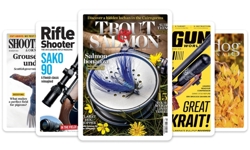I thought that it was only at IPC Media where Christmas started in March.
However, talking to other colleagues within the industry, I have realised that, in the subscriptions world, Christmas starts really early for all of us.
I still remember my first day at IPC on a hot day in July. Having moved from the business to business publishing sector where Christmas is actually a quiet time, I couldn’t believe it when I was presented with proofs for an insert that promoted the entire IPC portfolio as Christmas gifts. But now, as I’m preparing my third Christmas campaign for one of the UK’s largest consumer publishers, I understand why this is such a great focus.
I don’t think IPC is alone in realising the importance of the Christmas campaign. Having talked to three other leading consumer publishers, their Christmas campaigns also represent a huge part of their activities, and on average, generate 25% of their orders, from 18% of their budgets.
The PPA also contributes to the increased success of Christmas promotions. 2008 will be the third year running that will see the implementation of an extensive PR campaign to raise awareness of subscriptions, particularly during the Christmas period. The campaigns over the last two years have reached 28 million people in total. For the 2008 initiative, key consumer publishers are analysing their subscriber bases as well as conducting a survey asking key questions: from where they read their magazines to their Christmas buying habits. With great PR hooks, it is expected that this campaign will be the biggest yet and will help all publishers in their sales of magazine subscriptions during the festive season.
So, why are Christmas promotions so important?
1. They leverage your portfolio
From October to December, traditional targeting goes out of the window. Men buy woman&home, women buy Loaded and all kinds buy Golf Monthly. Everyone has the gift frenzy and multiple purchasing is at its peak. So a widespread campaign presents a unique opportunity to showcase your entire portfolio.
2. They provide a fantastic cross-sell opportunity
During Christmas, your chances of selling multiple subscriptions increase significantly. It’s so easy to buy a subscription and after all, it is a gift that lasts all year! So when you have a customer buying from you on the phone or on the web, you can upsell them additional subscriptions. At IPC, we have managed to upsell over 15% of our customers through these channels in previous years. Last year, we had a customer who bought 12 subscriptions.
3. The improved response rates help you justify additional activity
During the festive season, everyone is in the mood for buying. And this is reflected in your response rates. Whether it is direct mail, inserts or ads in-title, during this period, you will see response rates that are higher than anything you run throughout the rest of the year. Use this information wisely to ensure that you secure increased budgeted spend for Christmas campaigns.
4. Economies of scale
The huge size of the Christmas campaign for multi-title publishers means that you can achieve significant savings by maximising your purchasing power with suppliers and doing all your buying together. In particular, there should be significant savings to be achieved with print.
5. Innovation
Here at IPC, we see the Christmas period as a critical one for testing new ideas that will allow us to identify new opportunities for larger scale promotions and tactics that can be implemented successfully during the rest of the year.
I can’t really claim that all of them have been successful. Our radio advertising and promotions within department stores, for example, achieved costs per acquisition (CPA) and even life time value returns that would make any direct marketer feel very uncomfortable indeed – one of them generated a CPA 84 times greater than the average achieved during that year’s overall campaign. But it is also during this period that we have tested new ideas and media that have returned positive results and we have incorporated these into our ongoing activity.
So what makes a successful Christmas promotion?
Clearly the results determine the success of the campaign. At IPC, the campaign generates over 30% of the year’s new acquisitions from a little over 20% of the total marketing budget. The campaign continues to deliver fantastic results and, building on the previous year’s success, it creates huge value for the IPC portfolio.
There are some very clear dos and don’ts that we have identified after years of implementing the campaign, which I’ve summarised below:
The dos
* Do implement the same analysis that you do all year round. The Christmas campaign is not a time for your standards to slip. After all, you are spending a huge proportion of your marketing budgets, so implementing exhaustive analysis before deciding what to do is critical to the success of the campaign.
* Do get all your team to contribute. If you want to set up a big and successful campaign that promotes all titles in your portfolio, you need to get the whole team to work on it. At IPC, we set up working groups and assign a channel or promotion to each of these groups.
* Do have someone who has overall responsibility. Although the work needs to get distributed across the team, having one person centrally who is responsible for ensuring that every group works to the highest standard and meets every deadline is a must for a large campaign like this one.
* Do shop around! Doing all your printing and design together gives you huge buying power during this period. So talk to new suppliers, get many quotes and you will achieve significant savings.
* Do motivate the team, to ensure that everyone sees this campaign as an essential part of their role. Communication helps, as do competitions and recognition of good work and success.
* Do apply what you have learnt from the year to the campaign. Your best offers, your best creative tips, your best hosts are likely to also work during the Christmas period, so do analyse the results from activity implemented during the year and apply them to this campaign.
* Do test. How could you possibly improve the campaign in future years if you don’t test? Have a detailed and thorough testing plan. Also ensure testing happens across the key variables that can really swing your future response.
* Do test a prize draw. If you have a lot of promotional pieces in the campaign, you may find that you can negotiate a good prize at no cost, and this may increase your response rate.
* Do get editorial buy-in upfront. At IPC, we run campaigns through our in-house email newsletter and quarterly internal magazine as well as raising it at any meeting anyone in the team attends – your objective is to have subscriptions mentioned in your editors’ top picks for Christmas gifts!
* Do talk to other people in your and other industries – and establish new partnerships. Getting fresh customers is very important for the future success of the campaign.
And of course, we have also learnt a few things that we will not do again, so here they are…
The don’ts
* Don’t forget about renewals! If your Christmas campaign is as big as ours, you will have enormous renewal pools from previous gift buyers, so always remember to ensure your renewal process is working well and implement tests in your renewals activity too.
* Don’t delay briefing your fulfilment house. Involve them from the start, and make them feel part of the Christmas campaign team.
* Don’t take ‘no’ for an answer. Something may not appear possible at first from a logistical or fulfilment point of view. But challenge all the teams involved and make them find a solution to any problem that you are facing.
* Don’t get quotes too late. Start liaising with suppliers as early as you can. It’s the best way to ensure savings.
* Don’t assume anything. Check that everyone in the team is doing what they are meant to be doing. Challenge them on their analysis and don’t leave anything to chance.
* Don’t be disheartened if something doesn’t work. Having unsuccessful promotions mean that you have tested new things – and let’s be realistic – not everything you test will work!
* Don’t forget to do your maths. Ranking your sources and using this analysis to prioritise your resource is an essential element of the campaign.
* Don’t be too depressed if your really nice creative underperforms your controlled offer. Sadly, lovely creative doesn’t always work!
The future of Christmas campaigns
The internet is no doubt changing the way people order and their expectations about service. At IPC, we have noticed a significant increase in orders coming through the internet; in the last five years, we have seen a six fold increase in these orders. And we think we have just scratched the surface. With new technologies and intelligent marketing tactics, we will be able to continue improving on this to increase business from this new source even further.
What’s more, new technologies, such as showing samples of magazines electronically, may also help us sell more subscriptions to those who are undecided about what to buy for their loved one’s Christmas gift!
I have no doubt that if we keep applying exhaustive direct marketing principles to our take on Christmas, we will be able to keep growing this campaign. The increased awareness amongst the British population of subscriptions will also help drive sales.
Campaigns such as buying subscriptions through your Tesco Clubcard points or the packs sold in retail affiliates are no doubt helping drive this awareness and the PR efforts undertaken by the PPA and individual publishers are also contributing to the continued success of Christmas subscription promotions. So if you are not running them, what are you waiting for?
FEATURE
Deck the Halls
If the sight of Christmas decorations going up before the clocks have changed gets your goat, then a career in subscriptions is not for you. In subscriptions, the wrapper is barely off the last Creme Egg before the first Christmas planning meeting is called. Bea Montoya looks at why publishers spend so much time getting ready for Christmas.










